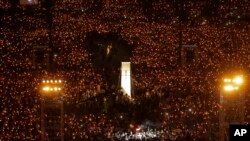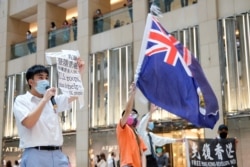Hong Kong police on Monday formally banned an annual candlelit vigil to mourn the victims of the crackdown on the 1989 Tiananmen pro-democracy movement that has taken place uninterrupted for 30 years, saying the event would pose a "major threat to public health", said organizers.
In response the Hong Kong Alliance in Support of Patriotic Democratic Movements of China is asking Hong Kongers to hold individual commemorations through small gatherings, lighting candles at home, or online meetings on Thursday night, the 31st anniversary of the military crackdown.
Already, after the Hong Kong government extended a ban on gatherings imposed over the coronavirus outbreak to June 4, the group had urged supporters to light candles wherever they are in the city on the anniversary.
Richard Tsoi, the group’s spokesman, told VOA that its members still plan to gather at Victoria Park to light candles in groups of eight, in order not to breach the government’s social distancing restrictions, and would stream the event live online.
He voiced fears that this year’s Tiananmen commemoration might be Hong Kong’s last, as national security laws imposed by China on Hong Kong would prevent and punish “acts and activities” that threaten national security, including secession, subversion and terrorism and foreign interference. The legislation would also allow Chinese national security organs to set up agencies in Hong Kong.
“There is a real danger that this might be the last time,” said Tsoi. “The definition of subversion under the national security law is broad and this means room for (this kind of) activities would be narrowed.”
The alliance's secretary-general Lee Cheuk-yan also expressed concerns over whether the vigil would be banned next year and whether chanting "end one-party dictatorship" -- a slogan chanted every year at the vigil -- would be regarded subversive under the new national security laws.
"It’s a litmus test of one country two systems, if they suppress us, it means that one country two systems is no more," he was cited by public broadcaster RTHK as saying.
Amnesty International has also expressed concern about the banning of the Honk Kong vigil. "By deeming this important memorial event ‘illegal’, the police have again needlessly exacerbated rising tensions when thousands of people simply want to light a candle for those who lost their lives during the horrific events of 4 June, 1989," said Amnesty International’s Deputy Director for East and South East Asia, Joshua Rosenzweig. “With this ban, and a disastrous national security law looming, it is not clear if Hong Kong’s Tiananmen vigil will ever be allowed to take place again.”
China’s parliament, the National People’s Congress, passed the plan in a vote last Thursday - details of the legislation will be drafted and could be enacted by August. Beijing said it was necessary to plug the national security “loophole,” which includes “foreign interference” blamed for stirring unrest in Hong Kong.
Police have already banned a march and two rallies that were scheduled to take place last Sunday, citing the risk of COVID-19 infection. Critics say the coronavirus restrictions have become “a tool for the crackdown on the freedom of speech and assembly.”
The actual number of deaths resulting from the suppression of the Tiananmen prodemocracy movement remains unknown as China has never provided a full accounting of the incident.
The death toll given by officials days after the 1989 crackdown was about 300, most of them soldiers, with only 23 students confirmed killed. A secret diplomatic cable from then-British ambassador to Beijing, Alan Donald, dated June 5, 1989, and released in 2017, said the Chinese army killed at least 10,000 people. This death toll is much higher than previously cited estimates, which ranged from hundreds to about 3,000.







